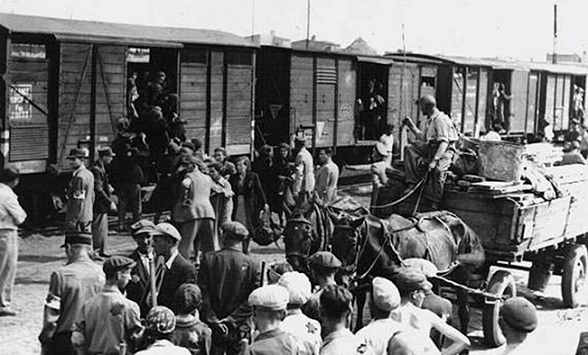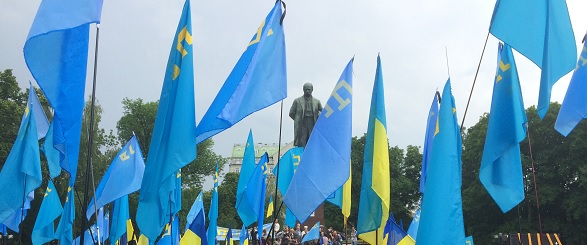We all know that most performances at Eurovision are ludicrous. Amidst bad artists, embarrassing choreographies and lyrics full of clichés, nationalism fever reaches unhealthy levels. A recipe for disaster. Unexpectedly, this year’s edition was different. Not that the quality improved – it certainly did not – but this time, the winner had something different. At least for a few moments, Jamala, with her song ‘1944’, made the continent a better place and its inhabitants more human.

The Crimean Tatars are the indigenous people of Crimea. Their ethnicity was formed in the process of synthesis of many Turkic and non-Turkic speaking tribes which inhabited the region centuries ago. In 1441, Haci Giray Khan, a direct descendant of Ghengis Khan, established the independent Crimean Khanate as part of the Ottoman Empire, a Turkic-speaking Muslim state which was among the strongest powers in Eastern Europe until the beginning of the 18th century. Their fate started to change when in 1783 Russia officially annexed Crimea for the first time. Subject to oppressive policies, hundreds of thousands of Crimean Tatars left their homeland in waves of mass emigrations, decreasing the population from estimated five million during the Crimean Khanate rule to less than 300,000, thus becoming a “minority” in their ancestral homeland.
Fast-forwarding to 1921, the Crimean Autonomous Soviet Socialist Republic (Crimean ASSR) was established at Lenin’s behest. The Crimean Tatars would live from 1923 to 1927 a golden age, with a vigorous renaissance of culture and education. Their joy didn’t last long tough. In 1927, their leader and his colleagues were arrested and executed by the central power in Moscow for being “bourgeois nationalists”.
In the time following the execution of the leaders, thousands of Crimean Tatars perished during the second mass deportation of their history. Furthermore, their alphabet was changed twice: in 1928 from Arabic script to Latin script and in 1938 from Latin script to Cyrillic script. Meanwhile, much of the Crimean Tatar political elite and intellectuals were marginalized and exiled.
As things are never so bad they can’t be made worse, hardship peaked in 1944, when Stalin accused the entire Crimean Tatar population of being Nazi collaborators. As a form of collective punishment, he deported – for the third time in their history – 200,000 Crimean Tatars to Urals, Siberia and to Uzbekistan in Central Asia. During the traumatic process, tens of thousands died of disease and starvation. In 1967, following an official decree that exonerated the Crimean Tatars from any wrongdoing during World War II, many tried to return – but just to find out that they were not welcome in their ancestral homeland. Thousands of Crimean Tatar families, once again, were deported from Crimea by the local authorities. Only in 1988 the ban on return lifted and Crimean Tatars returned, this time to an independent Ukraine.

As their fate seems to be a tragic version of “Groundhog Day”, once again Russia showed up for dinner without being invited. Based on Putin’s geopolitical considerations, Moscow annexed the peninsula in 2014 and, since then, the Crimean Tatars are once again being targeted and suffering persecution. Victims of arbitrary searches and arrests, they are discriminated against and harassed, while human rights defenders and media outlets who dare to denounce these untenable conditions are being silenced or killed. Moreover, the banning of the Mejlis of the Crimean Tatar People – the Crimean Tatars’ representative body – on 26 April 2016 is likely to leave this indigenous group even more vulnerable to systematic human rights abuses. Yet, Crimean Tatars remained throughout the centuries committed to a peaceful struggle.

When the final votes were being counted during the Eurovision 2016, there were left only three possible winners, among which Russian Sergey Lazarev and Jamala, of Crimean Tatar origin. It might be just a silly music contest for commercial ends, but when finally she was announced the winner, for a minute, there was hope in this continent. Her song ‘1944’ narrates the mass deportation of her people by Soviet troops during World War II and the consequent death of many of them, among which Jamala’s relatives.
For those who say that politicizing is a bad thing, please study some History. Episodes like these are a great example of how opportunities are not to be missed. In front of estimated 204 million viewers, Russian nationalists had to swallow the truth, at least for a night. And what a night.
The Crimean Tatars, despite everything, resist.
Cover Photo courtesy of the Global TribuneLicence: CC BY-NC-ND 2.0. The Deportation of the Crimean Tatars










